
Featured Blog | This community-written post highlights the best of what the game industry has to offer. Read more like it on the Game Developer Blogs or learn how to Submit Your Own Blog Post
Controlling the stream of mana in RPGs in order to empower the player to use the game's mechanics
When do you restore a player's mana and how does that effect how a player plays the game?

Many RPGs use mana points, or MP, to limit the amount of spells a player can use. Limiting the amount of spells the player can cast lets the developers give the player much more powerful spells and abilities, it also makes fighting power a resource that has to be managed.
Traditionally you get X/X amount of HP/MP to explore a dungeon, along with any items you happen to have bought or found along the way. You don't get any HP/MP back in between fights, and MP is typically the more limiting factor. You use it to cast both offensive and defensive spells but you only get so much of it until you find another save point you can restore it at. This means that players are mostly traveling from oasis to oasis, carefully rationing out their MP as though it was water in a desert.
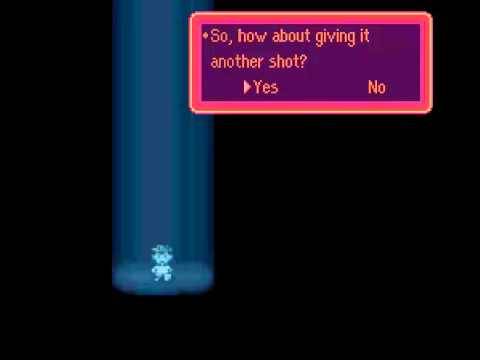
A lot of times when you do die it isn't because you ran out of MP but rather because you held back too much, you were trying to save your MP for later and underestimated your opponent. This is the threat of most enemies you run into, it's not that they can overpower you but that you either underestimate them and use too few resources to deal with them or that you overestimate them and blow too much which leaves you vulnerable to the next group.
Players are managing their resources of both HP/MP/items not just on a per fight basis but also in terms of a long series of fights. You only get so much HP/MP and you have to conserve it until you get to the next save point/inn/magic floating crystal. Now that sounds like great way to create challenges for the player, you are giving them conflicting short and long term goals they have to try and balance. In the short term they want to kill the enemies in front of them but in the long term they want to also have enough resources to deal with the next fight, and the fight after that, and the one after that...
But while in theory it creates a challenge the question remains if it is an interesting/fun challenge and what are the other costs of how the game implements that challenge? Since players have no idea how long they are going to have to go between oases they play quite conservatively with their precious resources, understandably so. But this leads to the first big problem, players aren't going to be using those cool special abilities/spells they got when they leveled up unless they absolutely have to. This means fights mostly consist of basic attacks as they are very mana efficient (they cost 0 MP). This can be profoundly frustrating, to get a new toy but not be able to ever use it, to have to hold back in every fight. It also makes every fight feel exactly the same since every time you are just selecting "Attack" regardless of who the enemy is.
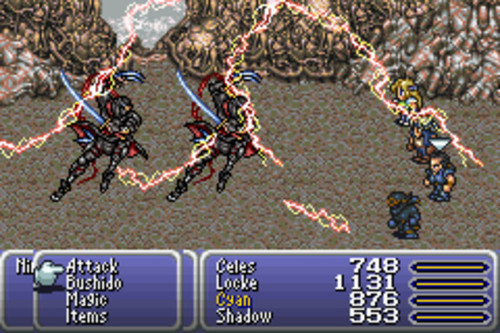
A lot of games do give the player abilities they can use for 0 MP, these characters tend to be really strong (or just more fun to play) just on the basis that they can deal good damage without using MP and then save that MP for healing party members.
The second big problem comes from the number of fights the player will get into between oases. If they get into a lot of fights then each group of enemies they face will have to be fairly weak or non-threatening, the threat isn't really in each fight but rather in the fact that the player has to beat a similar groups 20 more times without getting to refresh their MP. The more consecutive fights the player has to be able to endure before they get to heal up the less threatening each fight has to be. As games typically want to have a lot of fights in each dungeon (they want each dungeon to feel large and populated) most games have the player fight a great deal of easy enemies. This can make the RPG feel much more grindy and boring since you are rarely having a fight that is interesting in and of itself. Most complicated strategies require the use of spells and as such MP but you don't want to use that on weak enemies so the strategy for each fight is "Use basic attacks until they die".
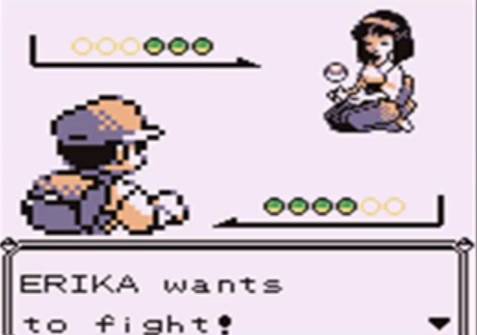
Pokemon is a great example of the consecutive fights problem. Notice how you almost never, until the very end of the game, fight an enemy trainer who has 6 Pokemon (the max a trainer can have and the amount every player will carry on them if they have caught more than 5 Pokemon). Traveling between towns will put you in combat with 5-10 trainers who each have 1-2 Pokemon instead of 2-3 trainers with 6 Pokemon each. Each of those scenarios can have the same number of Pokemon for you to fight through, but the game instead opts for more fights with the enemy trainer only having 1 Pokemon.
This is especially a shame since a great deal of the strategy in Pokemon comes from swapping between Pokemon and you never get to fight an enemy trainer who could do that even if the game's AI wanted to.
A couple of RPGs recently though have been removing this endurance test part of the game, they do this by making it so that you heal fully after every fight. This lets them make each and every fight much harder and much more interesting in and of itself. But while I have been quick to praise the removal of the endurance and grind of the RPG perhaps there is something to keeping parts of it. It can be very interesting to have to plan out how you will use your limited resources and it gives the game a sense of continuity between fights. It gives the fights consequences which can make even easy fights threatening to your long term prospects.
It also makes boss battles much more distinguishable and epic feeling. While it is nice that each fight in many of these RPGs can be challenging and interesting it this makes it hard for these games to make a boss battle feel different/epic as compared to every other fight. Perhaps the boss is slightly harder but they are fundamentally the same as all the other fights, as opposed to a lot of RPGs where the boss fight felt fundamentally different and more grand because they were the only fight you went into with full HP/MP and could really cut loose and throw everything you had at them.
Can we find a balance? Is there a way to give the player a long series of fights that have a continuity of resources between them, where each fight has an effect on the next, and yet each fight is interesting in and of itself, while the player is allowed/encouraged to use their fun and fancy spells? Well, let's look at how Persona Q tries to do just that.
So, how this specific mechanic works in Persona Q is that at the start of each and every fight you get a bit of HP/MP that will disappear at the end of the fight, basically you get a small pool of resources you can use for each character for each fight. Each character also has a larger pool of these resources to draw upon that is carried between fights.
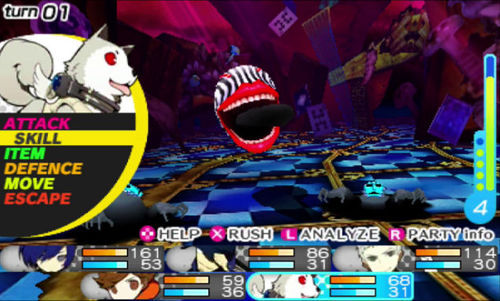
You can see at the bottom of the screen each character has a HP/MP bar, the darker part is the part that carried between fights and the lighter part is the buffer pool of HP/MP that you get specifically for this fight.
The first great thing about this is that it lets you use spells in each and every fight. You get this pool of mana you can use and if you don't use it before the end of the fight then it is gone, you are just leaving money on the table. So you use it, because you can, because it is fun to use abilities. You can't use spells with impunity though, you don't want to tap into the pool of MP that travels between fights unless you have to, but you are given enough that you can play and experiment with, or just blow away weaker enemies. The long term concern about your resources doesn't go away, but you are given enough of a buffer that each and every individual fight can be fun, interesting, and challenging.
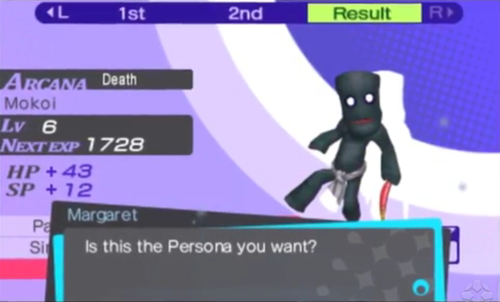
One of the great things about this system is that the size of these pools are another customizable stat instead of a set amount or percentage of the characters max. Some characters you want to give a large pool of MP and a small pool of HP, while some you want large pool of HP and small pool of MP, you get to choose. You can also choose to have one that gives a large pool of both but doesn't give good spells, or one that gives good spells but has very small pools of both. This becomes another interesting way to customize your characters.
Now I want to differentiate this system from systems that restore a bit of your mana after you win a fight, because the differences are actually very meaningful. First and foremost is that in the Persona Q system you can never come out of a fight with more mana then you went into it with (unless you used an item that restores mana but those are very limited). You get a bit of HP/MP you can use in that battle but you don't get to keep any of it when the fight ends. In games where you get a bit of HP/MP restored after battle you can do just that. Under those systems if you don't use any MP in a fight you can come out of a fight better off then you were when you went into that fight. You still want to conserve MP as much as possible which means that the pressure to not use abilities/spells, to conserve your MP, is still there unless you are already at max MP. In Persona Q you get a bit of MP you can use only during this specific fight, a bit of house money that you can spend without worrying about, which opens up your options in every fight.
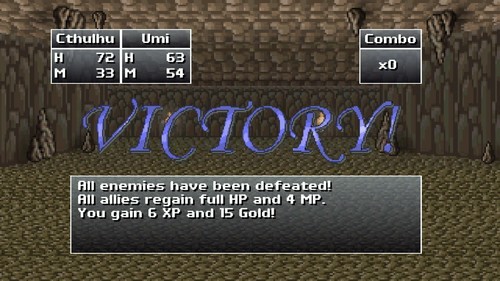
Unless your characters are vampires who drain the blood of their foes to heal they generally shouldn't be able to come out healthier then they went in. If a player can come out of a fight better than they went in then that removes the long term consequences of fighting that we are trying to preserve here.
One problem I do have with Persona Q's system is that it does give the player an incentive to artificially extend the fights. Imagine you have almost won a fight, there is only one enemy left and they are weakened, a couple of your characters though have a bit of MP left in their free to use pool of MP and a couple of your other characters are at low HP. You make the logical decision to not kill the enemy this turn and use that free MP to restore the long term HP of your other characters. That MP will disappear at the end of the fight, so heal up your allies while you can but you have to keep the enemy alive to do this.
This seems really strange because it doesn't make any common sense for characters to extend a fight so they can heal in front of their nearly dead enemies (unless they are really weird jerks), but this is a system that routinely calls on the player to do just that. It very much feels like an exploitable flaw in the system (perhaps there are benefits to it I don't see), but one that could be easily solved. Two easy ways to do this are 1)make the only resources the player had to try and conserve between fights their MP and items, make it so that everyone got full HP at the end of each fight, or 2) make the end of fight healing that the player was doing automatic, make it so that at the end of the fight anyone who has enough MP in their free use pool to cast a heal spell cast it on the lowest HP member of the team (you could also make it manually done).
Persona Q's system manages to allow each individual fight to be interesting and fun while maintain some of the long term consequences of the fights. I've said in the past that I am in favor of RPGs healing you after every fight, I felt like it allows fights that in a typical RPG would be very boring and grindy to instead be very fun and interesting. I am still in favor of it in many instances but I don't think I gave enough credit to how interesting a series of fights with limited resources can be. I just think RPGs need to give the players a bit of breathing room so that they can actually use their fun spells/abilities and create strategies more robust then hitting enemies with basic attacks until they win. Persona Q does that without removing the long term consequences of the battle, which is something pretty special.
Does that make sense?
Read more about:
Featured BlogsAbout the Author(s)
You May Also Like







.jpeg?width=700&auto=webp&quality=80&disable=upscale)








